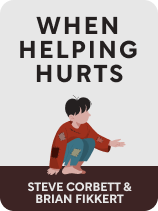

This article is an excerpt from the Shortform book guide to "When Helping Hurts" by Steve Corbett and Brian Fikkert. Shortform has the world's best summaries and analyses of books you should be reading.
Like this article? Sign up for a free trial here.
How can we better understand poverty? What is the mindset you should adopt to reduce poverty?
Many people misunderstand the nature of poverty, thinking it’s just a lack of resources when it’s actually a psychological issue. In When Helping Hurts, Steve Corbett and Brian Fikkert observe that this misunderstanding is compounded by a belief that we’re better than the people we’re trying to help.
Check out Corbett and Fikkert’s general advice on developing the right mindset to understand poverty.
Overcoming Superiority Complexes
Corbett and Fikkert point out that superiority complexes get in the way of building relationships and understanding poverty, which is crucial in poverty alleviation because the root cause of poverty is broken relationships with God, oneself, others, and creation. As such, they say the key to cultivating the right mindset for effective poverty alleviation is to see the poor as equals—fellow humans that you want to work with for mutual good, not inferior beings that you need to save from themselves.
The first step to seeing the poor as equals is to acknowledge your own brokenness. As we mentioned earlier, the sins of Adam and Eve caused all of creation to become broken—not just the relationships of the materially poor. So we all have broken relationships that need mending. The authors explain that this involves praying that God would give us discernment and humility to recognize and correct any misconceptions we harbor about God, ourselves, others, or creation and reality in general.
This especially includes misconceptions like superiority complexes that hinder our relationships with the poor. As God helps us repent of our superiority and mend these relationships, we’ll begin to recognize that people, no matter how poor, are all uniquely gifted and valuable. And our recognition of their unique value contributes to helping the poor by allowing us to combat their feelings of shame and helplessness.
Classifying Superiority Complexes
Let’s now look at how the authors identify and classify different superiority complexes to provide a sort of checklist for the process of self-examination and understanding poverty. Corbett and Fikkert identify two main superiority complexes that we need to repent of to minister effectively to the poor, especially in cross-cultural missions: cultural superiority and paternalism.
Cultural Superiority
The authors point out that every culture has a system of values that govern people’s behavior within that culture. A cultural superiority complex consists of failing to respect another culture’s value system when you interact with people of that culture. Whether you disregard the other culture’s values because you consciously view them as inferior and unimportant or you’re just oblivious to the differences, such disregard will cause misunderstandings and hinder relationships.
Cultural superiority complexes can be a problem any time Christians minister cross-culturally. The authors observe that the effect is greatest on mission trips to countries with very different cultures, but even different ethnic groups or neighborhoods within the same city sometimes have sufficiently different cultures to cause misunderstanding and friction.
Paternalism
The second type of superiority complex is paternalism. Paternalism consists of treating other people like children: deciding what’s best for them, providing for their needs, sometimes overruling their decisions for “their own good,” and so forth.
Corbett and Fikkert observe that when we treat the poor paternalistically because we feel superior to them, this tends to inhibit forming working relationships with them and often leads to relief efforts that do more harm than good.

———End of Preview———
Like what you just read? Read the rest of the world's best book summary and analysis of Steve Corbett and Brian Fikkert's "When Helping Hurts" at Shortform.
Here's what you'll find in our full When Helping Hurts summary:
- How many Christian church missions actually do more harm than good
- A look into the true nature and causes of poverty
- Suggestions for how to help the poor more effectively






